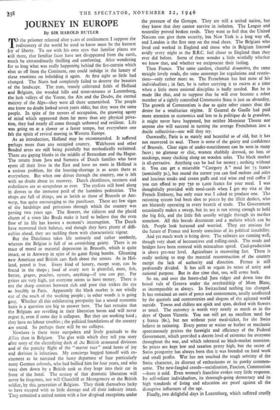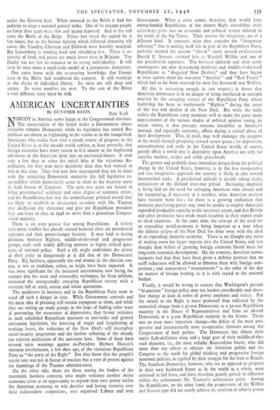JOURNEY IN EUROPE
By SIR HAROLD BUTLER
rthe prisoner released after years of confinement I suppose the ediscovery of the world he used to know must be the keenest Joy of liberty. To see with his own eyes that familiar places are still there, that familiar faces have not disappeared from the earth, much be extraordinarily thrilling and comforting. After wondering for so long what was really happening behind the fire-curtain which shut us off from the Continent, one could indulge in the luxury of these emotions on beholding it again. At first sight so little had changed. The Nazis had completely failed to destroy the beauties of the landscape. The trim, tensely cultivated fields of Holland and Belgium, the wooded hills and trout-streams of Luxemburg, the lush valleys of the Yonne, the Ain and the Doubs, the eternal majesty of the Alps—they were all there untarnished. The people one knew no doubt looked seven years older, but they were the same
people. In spite of the terrors of occupation, the gnawing agony of mind which oppressed them far more than any physical priva- tion, they had nearly all come through unbowed and resilient. Life was going on at a slower or a faster tempo, but everywhere one felt the spirit of revival moving in Western Europe.
As an introduction, Holland may be recommended. It suffered perhaps more than any occupied country. Walcheren and other flooded areas are still being painfully but methodically reclaimed. There are gaping blanks in the middle of Rotterdam and the Hague. The return from Java and Sumatra of Dutch families who have spent all their lives in the East and have no roots in Holland is a serious problem, for the housing-shortage is as acute there as everywhere. But when one drives through the country, one is left with no doubt about its recovery. Dutch cleanliness, neatness and orderliness are as scrupulous as ever. The cyclists still bowl along in droves to the immense peril of the harmless pedestrian. The shops are full of things, not as lavish as those of Brussels or Ant- werp, but quite encouraging to the purchaser. There are few signs of the hardships and privations through which the country was passing two years ago. The flowers, the tidiness and the placid charm of a town like Breda make it hard to believe that the even flow of its life has known a moment's interruption. The Dutch have recovered their balance, and though they have plenty of diffi- culties ahead, they are tackling them with characteristic vigour.
But the Dutchman takes life seriously and rather sombrely, whereas the Belgian is full of an astonishing gaiety. There is no trace of moral or material depression in Brussels, which is quite intact, or in Antwerp in spite of its 4,000 flying bombs. Gleaming new American and British cars flash about the streets. As in Hol- land, petrol is free. Every kind of luxury, except soap, can be found in the shops ; food of every sort is plentiful, meat, fish, butter, grapes, peaches, oysters, anything—if you can pay. For prices are very high, yet everyone seems to have money. There is not the sharp contrast between rich and poor that strikes the eye so forcibly in Paris. Apparently the black market is not wholly out of the reach of the working people ; in other words it is going grey. Whether all this exhilarating prosperity has a sound economic basis is a question too big to answer here. The fact remains that the Belgians are revelling in their liberation boom and will never regret it, even if some day it collapses. But they are working hard ; they have no labour troubles ; the political foundations of the country are sound. So perhaps there will be no collapse.
Nowhere is there more outspoken and lively gratitude to the Allies than in Belgium. The glee with which they tell you story after story of the electrifying dash of the British armoured divisions and of the panicky flight of the "master race" amid hoots of joy and derision is infectious. My concierge hugged himself with ex- citement as he narrated the hasty departure of four particularly nasty German colonels, who had bullied him for four years, and who were shot down by a British tank as they leapt into their car in front of the hotel. The ecstasy of that dramatic liberation will never be forgotten, nor will Churchill or Montgomery or the British soldier, by this generation of Belgians. They think themselves lucky to have escaped with so little damage and all their industry intact. They remained a united nation with a few despised exceptions under the pressure of the Gestapo. They are still a united nation, but they know that they cannot survive in isolation. The League and neutrality proved broken reeds. They want to feel that the United Nations can give them security, but New York is a long way off, and London is the first stop on the road there. The Belgians who lived and worked in England and those who in Belgium listened avidly every night to the B.B.C. feel closer to England than they ever did before. Some of them wonder a little wistfully whether we know that, and whether we reciprocate their feeling.
Then France. The same careless, cheerful douaniers, the same straight lovely roads, the same contempt for regulations and restric- tions—only rather more so. The Frenchman has lost none of his individualism ; in fact, he is rather carrying it to excess at a time when a little more national discipline is badly needed. But he is made like that, and to suppose that he will ever become a robot member of a tightly controlled Communist State is just an absurdity. The growth of Communism is due to quite other causes than the desire for a totalitarian regime. If General de Gaulle had paid more attention to economics and less to la politique de la grandeur, it might never have happened, but neither Monsieur Thorez nor anyone else will succeed in turning the average Frenchman into a docile collectivist—nor will they try.
Outwardly, Paris is as stately and beautiful as of old, but it has not recovered its soul. There is non:, of the gaiety and confidence of Brussels. Clear signs of under-nourishment can be seen in many faces ; no glamour or chic, women shabbily dressed, no hats or stockings, many clacking along on wooden soles. The black market is all-pervasive. Anything can be had for money ; nothing without it. You can get a miserable "Category A" meal for 75 francs (nominally 3s.), but round the corner you can find melons and soles and luscious steaks and cream puffs and real wine and real coffee if you can afford to pay 75o to r,000 francs for your meal. I was thoughtfully provided with meal-cards when I got my visa at the French Embassy, but only once was I asked to produce one. The rationing system had been shot to pieces by the illicit dealers, who are blatantly operating in every branch of trade. The Government occasionally makes a sweep, but its net is not strong enough to hold the big fish, and the little fish usually wriggle through its meshes somehow. All this breeds discontent and a malaise which can be felt. People look harassed and worried. They are anxious for the future of France and keenly conscious of its political instability.
And yet much work is being done. The railways are running well, though very short of locomotives and rolling-stock. The roads and bridges have been restored with miraculous speed. Coal-production is above pre-war level. Agriculture is recovering fast. There is really nothing to stop the material reconstruction of the country except the lack of authority and direction. France is still profoundly divided. It has still to regain its sense of unity and national purpose. But in due time that, too, will come back.
So on, and over the forest-clad Jura ridges and down into the broad vale of Geneva under the overlordship of Mont Blanc, as incomparable as always. In Switzerland nothing has changed. It has remained an oasis of peace and contentment, totally unaffected by the quarrels and controversies and slogans of the agitated world outside. Towns and chalets are spick and span, decked with flowers as usual. The currency is worth very nearly as much as in the days of Queen Victoria. You can still get an excellent meal for 5 francs (6s.), but not without your meal-ticket, for the Swiss believe in rationing. Every porter or waiter or barber or mechanic spontaneously praises the foresight and efficiency of the Federal Government, which provided a decent level of existence for everyone throughout the war, and which tolerated no black-market nonsense. So prices are kept low and taxation pretty high, but the secret of Swiss prosperity has always been that it was founded on hard work and small profits. War has not touched the tough sobriety of the Swiss character, its distrust of enthusiasms or its pawky common- sense. The new-fangled creeds—socialisation, Fascism, Communism —leave it cold. Even women's franchise evokes very little response. Its self-reliant individualism, its thorough-going democracy and its high standards of living and education are proof against all the disruptive influences of the age.
Finally, two delightful days in Luxemburg, which suffered cruelly under the German heel. When annexed to the Reich it had the audacity to stage a national general strike. Out of its 250,000 people no fewer than 3,000 were shot and 30,000 deported. And at the end came the Battle of the Bulge. Patton just saved the capital by a few hours, but in the furious fighting which followed charming old towns like Vianden, Clervaux and Diekirch were horribly mangled. But Luxemburg is working hard and rebuilding fast. There is no scarcity of food, and prices are much lower than in Belgium. The Duchy has not lost its romance or its strong individuality. It will soon be once more a small-scale model of a prosperous democracy.
One came home with the re-assuring knowledge that Europe west of the Rhine had weathered the tempest. It still worships at the shrine of individual liberty. Its roots are still deep and secure. Its worst troubles are over. To the east of the Rhine a very different story must be told.



































 Previous page
Previous page